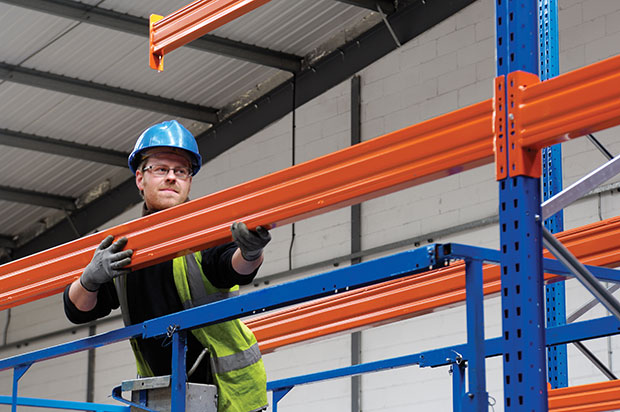Warehouses are possibly at the busiest period they have ever been. The upward trajectory in e-commerce is predicted to continue, albeit at a slower rate than the lockdown years. This is a boom time for the logistics industry, but this growth reinforces the need to pay attention to the details. Making sure the highest quality standards are upheld and your employees are kept safe at work – even when pressure on the environment is high.
 For warehouse owners and managers, guidance can be found in several regulations and guidance documents. These cover everything from correct handling measures, safe design of racking systems and guidance on how to maintain your equipment.
For warehouse owners and managers, guidance can be found in several regulations and guidance documents. These cover everything from correct handling measures, safe design of racking systems and guidance on how to maintain your equipment.
One area that is equally as important is taking the correct steps for your pallet racking installation. That includes checking the credentials of your installer, especially when you consider that even the smallest alteration from the manufacturer’s specification can have severe consequences.
Racking Regulations
In this industry, it is fair to say that many installers ‘learn on the job’ with no formal qualification. In most cases, the quality of their work will only be as good as the skills of their fellow team members and supervisor. In other words, it can come with risks.
Warehouse owners and managers should be aware that, to meet your health and safety obligations, you are responsible for checking the credentials of your installers. HSG76 Warehousing and Storage: A Guide to Health and Safety, produced by the HSE, expects you to check that you are using ‘competent’ people for any work in your warehouse.
Although there is some element of grey surrounding the topic, racking installations can fall under the category of a construction project and as such you must abide by the Construction Design & Management Regulations 2015 (CDM 2015). These expect you to check health and safety standards of any installers working on your site. Within the construction industry, one of the easiest ways to check is by asking to see your contractors CSCS card.
What is a CSCS card?
The Construction Skills Certification Scheme, also known as CSCS, is the leading training and qualification verification scheme for the construction industry. It aims to improve standards and safety in the UK by ensuring all construction workers receive appropriate training and qualifications for their roles.
Holding a CSCS card is not a legal requirement, and it is up to the Main/Principal contractor or client to decide if their site workers need one. However, a CSCS card does offer a quick way to check the qualifications of contractors on site and meet your health and safety requirements.
Do you need a CSCS card for racking installations?
When the card scheme was first launched there were several different cards available which covered traditional and specialised roles plus any construction-related professions which did not fall into any other CSCS card category. This included the Construction Related Occupation (CRO) card which racking installers could get on employee recommendation alone with no other training.
To improve safety levels, CSCS made steps to remove these cards and in its place launched the Partner Card Scheme which would ensure specific training for skilled roles. To show the CSCS logo on their card each of the 38 organisations currently signed up to the alliance must agree to meet appropriate qualifications and set a minimum standard for each occupation. On construction projects, racking is a skilled trade and the only way to get a CSCS card for this specific work is through SEIRS.
What is SEIRS?
SEIRS aims to raise standards within the industry by training installers on correct installation methods to SEMA standards. Installers can opt for a standard SEIRS card or they can specifically apply for the CSCS qualification as long as they have passed the appropriate CITB Health, Safety and Environment test.
Training forms a central part of SEIRS. To achieve a full SEIRS card, installers must attend two courses:
•SEIRS Foundation is an introduction course that instructs installers on generic and industry-specific health and safety issues. At the end of the course, installers receive a SEIRS Trainee card which is valid for six months. This period enables the trainee to develop and enhance their skill sets on sites while under supervision.
•SEIRS Diploma is a two-day course which completes the installer’s training. On successfully passing a thorough assessment process, installers are awarded a full SEIRS card which is valid for five years. The course includes a mixture of classroom-based theory and, in a first for the industry, a very significant practical element. This course has been designed to be stringent and challenging with an emphasis on the practical component of racking installations under assessment conditions. Installers must attend a General Refresher training course every five years.
Don’t take the risk, next time you have racking installers in your warehouse, ask to see their SEIRS card.
SEMA
t: 01543 278489





Comments are closed.